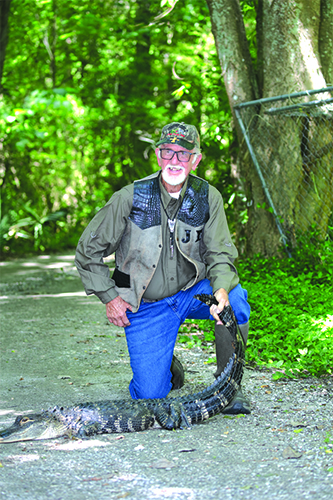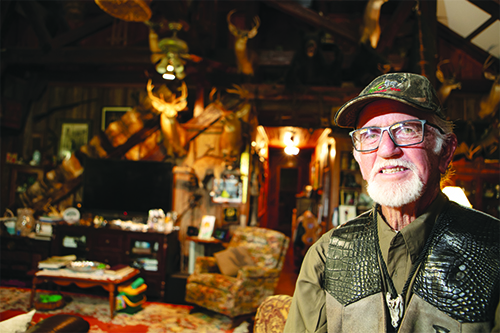See You Later, Alligator
Meet “Trapper Jack” Douglas
Anyone driving down a country road at night knows to keep their eye out for deer. But in coastal Georgia and South Carolina’s Lowcountry, there’s another animal that could wreck your car—and it ain’t bushy-tailed.
“Big gators will cross the road all they want during mating season,” says “Trapper Jack” Douglas, a professional trapper who, at 78 years old, still works every day. “They’ll go and check in every pond they can check until mating season is over.”

Douglas has been a professional trapper for more than 30 years. He gets daily calls from law enforcement to trap what are known as nuisance animals. Very often, the call is about an alligator.
“On the highway, in a swimming pool, wherever,” Douglas says. “I make myself available 24/7. I try to make church every Sunday, but I even get called out of there sometimes.”
Hard To Handle
Born and raised in Savannah, Jack Douglas grew up hunting deer and wild hogs and doing a lot of fishing. He was in his forties when he learned about an opportunity from the Georgia Department of Natural Resources (DNR).
“When the gators started getting out of hand in the 1980s, the game wardens couldn’t handle all the calls,” he says. “So they started hiring their own trappers.”
Once the alligator population became manageable again, Douglas would get calls about the ones considered a nuisance. Other wildlife such as coyotes and skunks can also be trapped as nuisance animals if they have the potential to cause injury to humans or property damage. Some are relocated while others may be killed. Typically, Douglas will relocate gators that are smaller than six feet.
“Depending on where I catch them, I will go about 20 miles north or south to relocate them,” Douglas says. “That has always seemed to work pretty well.”
Today, the balance that keeps a flourishing gator population from becoming problematic is kept through a regulated hunting season that spans from late August to early October. Hunters must apply for a tag from the Wildlife Resources Division of the Georgia DNR, and because of demand, applicants are selected by lottery. The DNR also provides instructions for humanely killing and harvesting an alligator for meat.
Rolling On
Those hunting tag lotto winners can look forward to a unique experience, often getting up close and personal with a gator. Even after 30 years, it can still be a thrilling experience for Douglas.
“Just making that perfect cast with that little ol’ line and bringing in a 300-pound alligator, I don’t think that’ll ever get old to me,” he says.
Some of the gators do manage to surprise him, though.
“There was one, in the middle of the night on Highway 21, I put on a line on him and let him do some rolling until he calmed down,” Douglas recalls. “You’ve got to get on top of them to tie them, so I had one guy holding him with snare and I was on top of him and everything was fine.”
But the gator had one more roll in him, and he took Douglas with him.
“He whirled us all the way around and when I came up, I was sitting right back on top of him like I was,” Douglas says with a laugh. “I let him settle down and then he let us tape him up. I’ve had a lot of gators roll me halfway, but I’ve never had one roll me like that before. I was lucky. I think the Lord was looking after me.”
